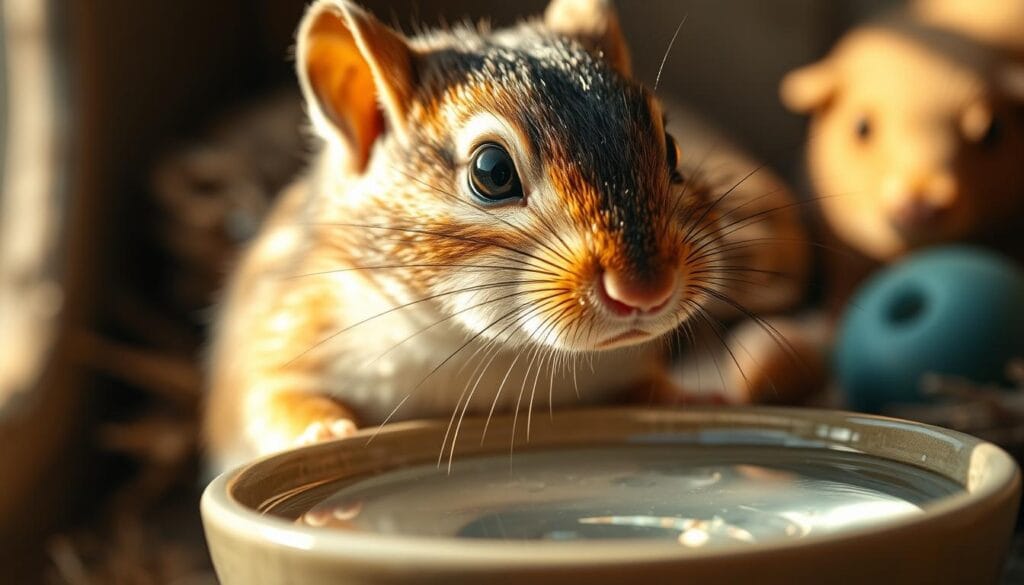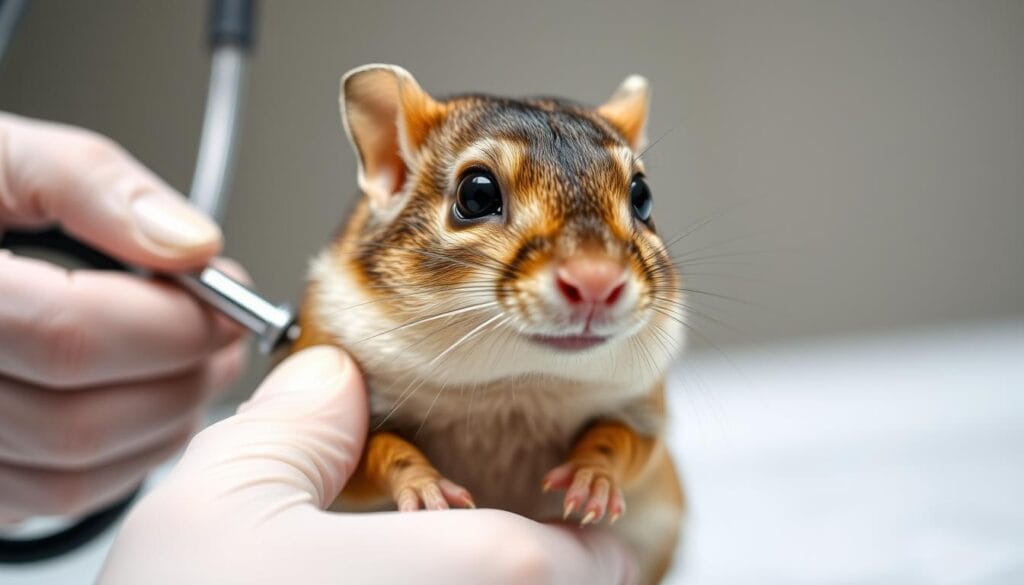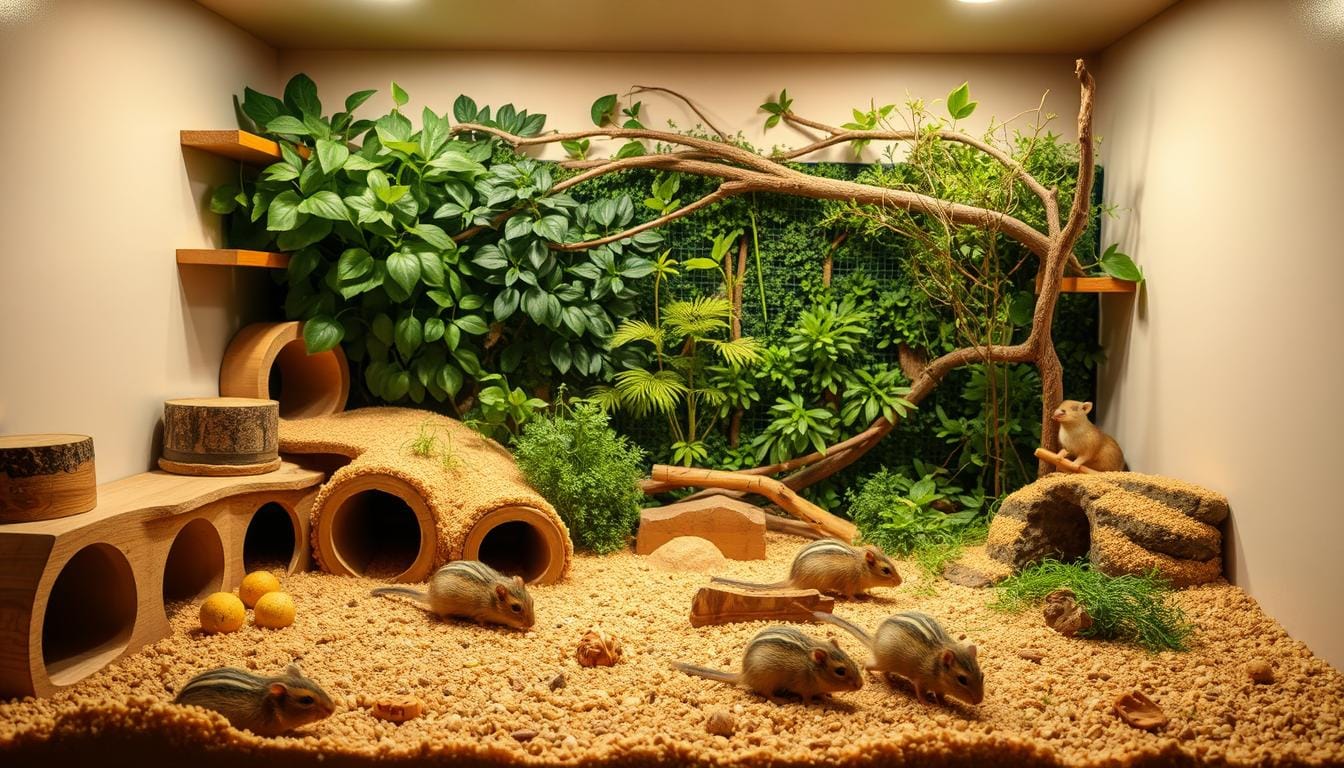Welcoming a degu into your home means getting a tiny, curious friend. They live for 5 to 8 years. These social, daytime animals chirp and explore, needing a stable routine to be happy.
A good degus daily care routine helps them thrive. Your degu needs space, food, and fun every day. This builds trust between you and your pet.
Table of Contents
Understanding Your Degus: An Introduction
Degus come from Chile’s dry lands and love to be with others. They need friends to be happy. Unlike gerbils, degus have special tails and feet for digging and climbing.
When it comes to degus care tips, housing is key. Here’s what you should know:
- Give them big cages with lots of levels to feel at home.
- Put in tunnels and chew toys to keep them busy digging and foraging.
- Watch how they get along when you introduce new degus to avoid fights.
They live for 6-8 years, so caring for them is crucial. They need lots of hay every day to keep their teeth healthy. Make sure they get at least 30 minutes outside their cage each day for exercise. Stay away from sugary foods to prevent diabetes.
Degus are smart and talk to each other with chirps and scent marks. Degus care tips say to keep them mentally active by changing toys often. Check their feet and tail for signs of health.
It’s important to remember that degus are social animals. Being alone can make them stressed. So, pair them up early and make sure their home lets them dig and climb. This helps them feel safe and happy.
Creating the Perfect Habitat for Your Degus
Creating a good degus habitat setup means paying attention to their natural behaviors. Degus love to move around and need a space that feels like their wild home. Follow these degus care tips to keep your pets happy and healthy.
Cage Size and Material Requirements
- Cages should be at least 24″ (L) x 18″ (W) x 24″ (H) but bigger is better.
- Choose metal wire cages because plastic or wood can get chewed up.
- Go for solid roofs to help reduce stress from feeling like they’re being watched.
Bedding Selection and Replacement Schedule
| Bedding Type | Purpose | Cleaning Schedule |
|---|---|---|
| Timothy hay mix | Digging and foraging base layer | Spot clean daily |
| Unprinted shredded paper | Hygiene layer | Replace weekly |
| Pelletted aspen bedding | Absorbent odor control | Spot clean daily |
Temperature and Lighting Considerations
Keep the temperature between 65-75°F. Don’t put them in direct sunlight but give them 12 hours of light a day. Use a thermometer to check the temperature.
Essential Cage Accessories
- Two nest boxes for hiding and nesting (minimum 8″ x 6″ x 6″).
- Wire platforms at different heights for climbing.
- 11″ solid-surface exercise wheels to prevent tail injuries.
- Heavy ceramic food bowls and drip-free water bottles.
“Degus instinctively bury food—they need deep bedding layers to express natural behaviors.”
Regular checks keep your degus’ home safe. Mix these elements to encourage natural behavior while keeping safety and cleanliness first.
Comprehensive Degus Daily Care Routine
Keeping a regular care routine is key for your degus’ health and happiness. Here’s how to set up a structured space that meets their natural needs:
Morning Care Checklist
- Replace water and provide fresh Timothy hay (80% of their diet).
- Offer a measured portion of pellets (10%) and 1–2 teaspoons of vegetables (10%).
- Remove uneaten food and spot-clean soiled bedding daily.
Afternoon Maintenance Tasks
Set aside 1 hour daily for playtime. Give them wooden chew toys to keep their teeth in check. Also, use gentle handling to bond with them.
Evening Care Procedures
- Refill hay and check for signs of stress or weight loss during your final health scan.
- Ensure quiet surroundings for sleep—maintain temperatures between 64°F–75°F.
Weekly Deep Cleaning Schedule
Every two weeks, do a deep clean of their cage:
| 1. Relocate degus to a safe holding area. |
| 2. Disassemble the cage and clean all surfaces with pet-safe disinfectant. |
| 3. Replace bedding but retain some old bedding to preserve familiar scents. |
| 4. Inspect toys and replace worn items to prevent injury risks. |
Also, take them to the vet monthly to check their teeth and coat. Degus do well in pairs, so try to keep them together. A steady routine helps reduce stress and can add years to their life—up to 10 years with the right care.
Hydration Needs: Water Requirements for Healthy Degus

Keeping fresh water available is key for degus. They need clean, room-temperature water all the time. Since they come from dry places, they must drink water daily to stay healthy.
Use metal sipper bottles to stop them from chewing on plastic. Make sure the bottles are at levels your degu likes. Change the water every day to keep them hydrated. Watch how much they drink; a big drop could mean they’re sick.
- Clean bottles twice weekly with a 1:10 bleach solution, rinsing thoroughly.
- Check sipper tubes for blockages daily.
- Discard old water immediately if it looks cloudy or smells.
Dehydration signs include dry fur, sunken eyes, or being very tired. If you see these, get help from a vet right away. Use filtered water to keep their sensitive systems safe. Drinking enough water helps prevent diabetes from sugary foods.
Make sure they have clean water and a hay-based diet. Water and diet help keep their digestive and urinary systems healthy. Check their water intake every day to spot problems early.
Exercise and Enrichment: Keeping Your Degus Active
Active degus need daily fun to stay happy and healthy. Activities keep their minds sharp and bodies active. They help reduce stress and keep them busy.
Start by giving them safe places to explore and play. This is the first step to a happy degu.
Safe Exercise Wheel Options
Choose a wheel that’s at least 11 inches in diameter. It should have a solid surface to avoid injuries. Look for durable materials like metal or chew-resistant plastic.
Brands like Silent Runner or Wodent make safe wheels. Avoid wheels with wire rungs that can harm their tails or feet.
Playtime Outside the Cage
Give degus a chance to explore outside their cage every day. Use a playpen with 18-inch walls to keep them safe. Make sure to cover electrical wires and secure furniture legs.
Playtime should last 30–60 minutes. This encourages them to dig and climb naturally.
DIY Toys and Enrichment Activities
Make your own fun toys and activities for them:
- Dig Boxes: Fill a container with potting soil for burrowing.
- Foraging Puzzles: Hide treats in cardboard tubes or hay bales.
- Chewable Structures: Stack untreated wood branches into climbing towers.
| Activity | Materials | Benefits |
|---|---|---|
| Dig Boxes | Potting soil, large container | Mimics natural burrowing instincts |
| Cardboard Tunnels | Cardboard tubes, boxes | Encourages exploration and chewing |
| Scatter Feeding | Cut veggies, foraging mats | Simulates natural foraging behavior |
Preventing Boredom and Destructive Habors
Change toys every week to keep them interesting. Signs of boredom include overgrooming or chewing cage bars. Offer daily sand baths using chinchilla-safe dust to keep their coat healthy.
Limit sand baths to 10–15 minutes. Watch for signs of stress like repetitive pacing or lethargy.
Health Monitoring: Signs of a Happy and Healthy Degu

Watching over degus health means paying attention every day. A healthy degu has bright eyes, clean ears, and moves around a lot. If they stop eating or seem really tired, they need help fast.
- Teeth: Look for any signs of dental problems like overgrowth or drooling.
- Coat: A clean coat means your degu is doing well. But, matted fur or bald spots could mean they’re stressed or sick.
- Activity: Degus love to be around others. If they’re alone a lot or pacing, it’s a sign they’re upset.
It’s important to weigh your degu every week. This helps catch any health problems early, like diabetes. Also, watch for any discharge from their eyes or nose, which could mean they have a cold.
If your degu acts strangely, like being mean or not wanting to eat, get help right away. The Animal Welfare Act says you must take care of your pet’s health. The GSPCA’s emergency line, 01481 257261, is ready to help 24/7.
Learn more about caring for small animals at Exotic Pet Haven’s resources. Keeping an eye on your degu’s behavior helps them stay healthy. Regular vet visits are important, as they make sure your pet is happy and safe.
Essential Grooming Practices for Degus
Keeping your degu clean is key to their health. Regular grooming stops health problems and makes your bond stronger. Focus on three main areas to keep them healthy and happy.
Dust Bath Techniques and Frequency
Give your degu a shallow tray with chinchilla dust 2–3 times a week. Let them soak for 15–20 minutes. Then, clean out the dust to prevent dry skin.
Use only dust, not sand, and change it every week. This keeps it fresh and clean.
Nail Care and Maintenance
- Offer rough-textured cage items like wooden branches to naturally wear down nails.
- Trim overgrown nails only if necessary, using sharp clippers and caution near the quick.
- Visit a vet if nails curl under the foot or disrupt walking.
Dental Health Monitoring
Check their teeth weekly for any color changes or misalignment. Offer hay daily to help their teeth grow. Look out for signs like drooling, loss of appetite, or eye discharge.
If you see these signs, get vet help right away.
Regular checks and care make grooming easy. Follow these steps to keep your degu healthy and happy.
Building Trust: Socialization Tips for Degus
Effective degus socialization needs patience and understanding of their cautious degus behavior. As prey animals, they love predictable routines and slow introductions to new things.
“Trust with degus is earned through consistency and calm interactions,” says degu care experts.
- Start with quiet observation sessions near their habitat to avoid startling them.
- Offer sunflower seeds through cage bars to create positive associations with your presence.
- Gradually transition to hand-feeding once they approach voluntarily.
- Begin short handling sessions (2-3 minutes) only after they show comfort with you.
| Phase | Action | Goal |
|---|---|---|
| Phase 1 | Sit calmly nearby | Reduce stress |
| Phase 2 | Hand-feeding treats | Build trust |
| Phase 3 | 10-second holds | Accustom to touch |
- Always support hind legs when lifting to prevent falls
- Avoid sudden movements—move slowly to prevent flight response
- Never grasp tails; this can cause painful tail loss
Positive reinforcement with treats strengthens bonds. Watch for body language: flattened ears or rapid tail twitching signal stress. Consistent degus socialization makes them calmer over time with gentle interaction.
Conclusion: Maintaining a Consistent Routine for Thriving Degus
Keeping a regular care routine is key for your degus‘ health and happiness. They need a diet rich in fiber and low in sugar. Give them unlimited hay and 10–15g of commercial nuggets each day. But, avoid sugary treats like fruits, except for an occasional apple slice.
Make sure they always have fresh water and a clean living space. This helps prevent diabetes and dental problems. Regular exercise and mental stimulation are also important to keep them active.
Even when you’re away, keep their routine going by arranging a caregiver who knows their needs. Don’t forget to take them to the vet once a year. This helps catch any health issues early. Degus love routine, which builds trust and reduces stress.
By focusing on their special diet and daily care, you create a great environment for them. Small actions, like changing hay piles or playing with them, make a big difference. Your commitment to their care strengthens your bond and brings joy for years to come.

